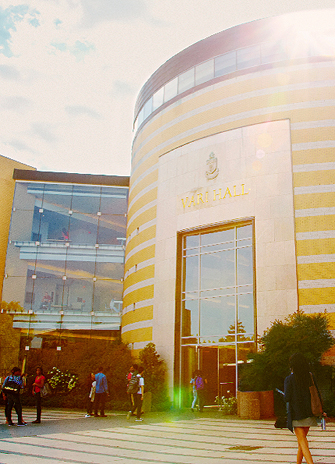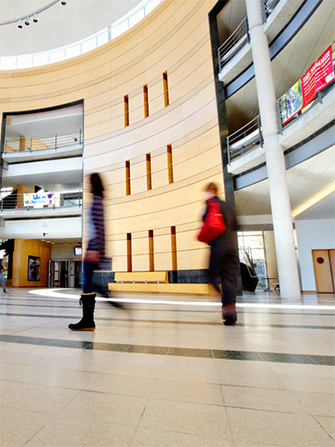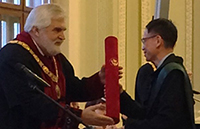York University students, staff and faculty know how #ActionsMatter when it comes to stopping gender-based violence, as a result of a pan-university collaborative initiative by the Office of the President, the Lassonde School of Engineering, the Centre for Human Rights, the Department of Community Safety and the York Federation of Students.

 At York University, from Nov. 28 until Dec. 6, messages on whiteboards posted to social media with the hashtag #ActionsMatter are telling the stories of how the York community is taking action. Examples include having 50/50 gender balance at events, letting another woman know how she has been inspiring, developing inclusive programs and courses, encouraging co-op students to contribute to inclusive workplace cultures, providing training for female student leadership, standing up for any oppression in STEM, supporting female colleagues’ vision, telling female friends they can do anything, supporting a daughter’s dreams and being an active bystander.
At York University, from Nov. 28 until Dec. 6, messages on whiteboards posted to social media with the hashtag #ActionsMatter are telling the stories of how the York community is taking action. Examples include having 50/50 gender balance at events, letting another woman know how she has been inspiring, developing inclusive programs and courses, encouraging co-op students to contribute to inclusive workplace cultures, providing training for female student leadership, standing up for any oppression in STEM, supporting female colleagues’ vision, telling female friends they can do anything, supporting a daughter’s dreams and being an active bystander.
At this time of the year, we are reminded of the gender-based violence that shocked the nation on Dec. 6, 1989, when 14 young women were killed at l’École Polytechnique de Montréal. They died because they were women in an engineering school.

 Since 1991, the Parliament of Canada has marked the anniversary of this day as the National Day of Remembrance & Action on Violence against Women. It is an opportunity to reflect on the phenomenon of violence against women in our society and consider concrete actions to eliminate all forms of violence against women, as well as Indigenous, racialized, LGBTQ and people with disabilities in our society.
Since 1991, the Parliament of Canada has marked the anniversary of this day as the National Day of Remembrance & Action on Violence against Women. It is an opportunity to reflect on the phenomenon of violence against women in our society and consider concrete actions to eliminate all forms of violence against women, as well as Indigenous, racialized, LGBTQ and people with disabilities in our society.
Unfortunately, little has changed over the past 27 years. In 2012, an Angus Reid Omnibus Survey commissioned by the Canadian Women’s Foundation tells us 67 per cent of Canadians say they have personally known at least one woman who has experienced physical abuse, and some women are disproportionally affected by violence due to their intersectional positioning.
This year, the Government of Canada launched an independent national inquiry into missing and murdered Indigenous women and girls to “examine and report on the systemic causes behind the violence that Indigenous women and girls experience, and their greater vulnerability to violence, by looking for patterns and underlying factors that explain why higher levels of violence occur … [such as] historical, social, economic, institutional and cultural factors.”
On Monday, Dec. 5, the University will host a memorial event to remember the 14 women lost to violence, and to talk about other actions our community can take to end violence against women. Speaking at the event will be York University President and Vice-Chancellor Mamdouh Shoukri, Board of Governors Member Julie Lassonde, Executive Director of Community Safety Samina Sami, Executive Director of the Centre for Human Rights Michael Charles, and Lassonde School of Engineering Assistant Dean Inclusivity and Diversity Marisa Sterling.
Please consider attending and making a pledge, because our actions matter.
The event takes place from noon to 1pm at the Bergeron Centre for Engineering Excellence, First Floor Café.
Article provided by Marisa Sterling (Lassonde) and Regan Mancini (Centre for Human Rights)
 York University’s annual Fair Trade Fair will take place Wednesday, Jan. 18 in Vari Hall and the Ross link from 10am to 4pm.
York University’s annual Fair Trade Fair will take place Wednesday, Jan. 18 in Vari Hall and the Ross link from 10am to 4pm.












